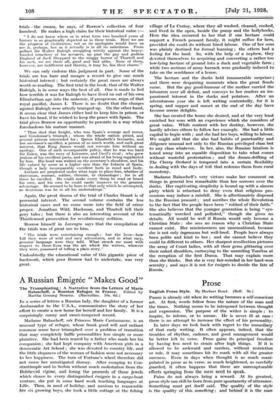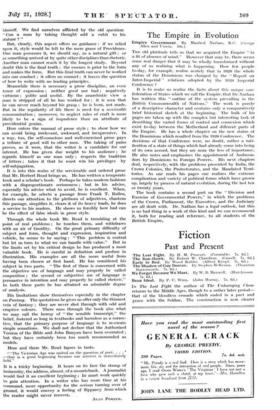Prose
English Prose-Style. By Herbert Read. (Bell. 9s.) PROSE is already old when its writing becomes a self-conscious art. At first, words follow from the nature of the man and the times. Nothing seems to be interposed between thought and expression. The purpose of the writer is simple ; to inspire, to inform, or to amuse. He is never ill at ease : there is no attempt to increase the effect of his personality.
In later days we look back with regret to the immediacy of that early writing. It often appears, indeed, that the troubles of rhythm, cadence, and good management would be better left to verse. Prose gains its principal freedom by having less need to strain after high things. If it is allowed to be awkward and careless, without restriction or rule, it may sometimes hit its mark with all the greater sureness. Even in days when thought is as much mani- pulated in prose as in verse, as much heightened, as carefully guarded, it often happens that there are unrecapturable effects springing from the mere need to speak.
Pains do not always bring a reward. At its greatest, prose style can still be born from pure spontaneity of utterance. Something must get itself said. The quality of the style is the quality of this something ; and behind it is the man himself. We find ourselves afflicted by the old question: Can a man by taking thought add a cubit to his stature ? "
But, clearly, this aspect offers no guidance : if we relied upon it, style would be left to the mere grace of Providence. One man possesses it, we should say, as a natural gift ; or as something arrived at by quite other disciplines than rhetoric. Another man cannot reach it by the longeit study. Beyond doubt this is the final truth ; the essence is prior to the form and makes the form. But this final truth can never be worked into our conduct ; it offers no counsel ; it leaves the question of how to write with no leading principles.
Meanwhile there is necessary a prose discipline, an even tenor of expression ; neither good nor bad ; negatively virtuous ; polite and useful. By the anarchistic view a
man is stripped of all he has worked for ; it is seen that he can never reach beyond his grasp ; he is born, not made. But in the regularity of life there is need for a semiceable communication ; moreover, to neglect rules of craft is more likely to be a sign of impudence than an attribute of providential genius.
Here enters the manual of prose style ; to show how we can avoid being irrelevant, awkward, and inexpressive. In a way, too, the self-conscious and well-exercised prose pays a tribute of good will to other men. The taking of pains proves, as it were, that the writer is a candidate for our interest. He has given due weight to his audience ; he regards himself as one man only ; respects the tradition of letters ; takes it that he must win his privileges by self-subjugation.
It is into this realm of the serviceable and ordered prose that Mr. Herbert Read brings us. He has written a temperate book and a scholar's book. Perhaps he takes modern fashions with a disproportionate seriousness ; but in his advice, especially his advice what to avoid, he is excellent. When, for example, he selects a passage from Frank T. Bullen, directs our attention to the plethora of adjectives, chastens this passage, simplifies it, clears it of its heavy loads, he does a service to his readers. He shows us forcibly how bad can be the effect of false ideals in prose style.
Through the whole book Mr. Read is trembling at the point of real problems ; he touches them, and withdraws with an air of timidity. On the great primary difficulty of subject and form, thought and expression, inspiration and vehicle, he seems to be saying : " This problem is central hitt let us turn to what we can handle with value." But in the limits set by his critical design he has produced a most valuable book. He is eareful in definition and profuse in illustration. His examples are all the more useful from having been chosen at first hand. He has considered his subject in two parts. " The first of these is concerned with the objective use of language and may properly be called composition ; the second or subjective use of language is persuasive in intention and may properly be called rhetoric."
In both these parts he has attained an admirable degree of analysis.
His limitations show themselves especially in the chapter on Fantasy. The quotations he gives us offer only the thinnest vein of fantasy ; they are never shot through with odd and
eruptive colours. There runs through the book also what we may call the heresy of " the sensible transcript," the belief, fostered so long in textbooks and harmless_ as a correc- tive, that the primary purpose of language is to re-create simile sensations. We shall not declare that the Authorized Version of the Bible and John Bunyan have been overrated ; kilt they have certainly been too much recommended as models.
Here and there Mr. Read lapses in taste.
" The Victorian Age was united on the question of port. . . . ' —that is a good beginning because our interest is immediately held."
It is a tricky beginning. It bears on its face the stamp of insincerity, the address, almost, of a mountebank. A journalist would find it an excellent beginning ; he must work quickly
to gain attention. • In a writer who has more time at his command,. more opportunity for the serious turning over of
ground, it would convey a feeling of flippancy from which the reader might never recover. _ ALAN PORTER.





















































 Previous page
Previous page